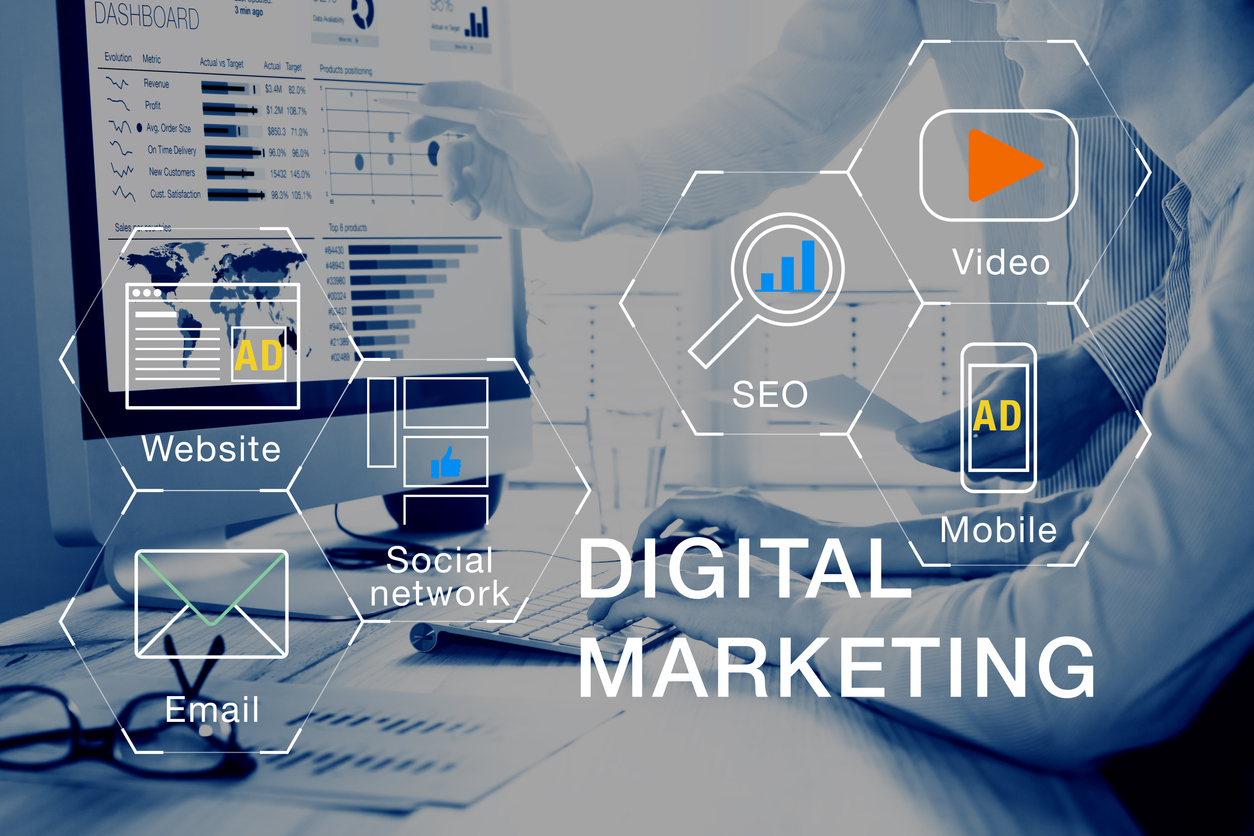Social Media vs. Website: Which is Best for Your Business?
You know the old question, “Which came first, the chicken or the egg?”
Have you ever actually tried to think about that for a minute? Makes your brain hurt, doesn’t it?
Well, there’s a similar brain freeze that consultants often encounter when they’re just getting their businesses started:
“Which is most important for my business, a website or a social media presence?”
This is a fairly recent conundrum.
Before the invention of social media platforms, an online business lived or died by its website. If you didn’t drive traffic to your site where you could make sales, you were out of business.
In recent years, though, with the rise of social media and its unbelievable popularity, businesses have flocked to these platforms to engage a broader audience. And since it’s often easier to grow a large following on Twitter or Facebook than it is to grow a large in-house mailing list, many businesses have put more and more time and effort into their social media posting.
In fact, many new business start-ups today are seriously considering establishing their business presence on social media only and dispensing with a website completely.
So, what’s the best marketing strategy for your business? Website only? Social media only? Both?
In this post, we break down all the options and give you our recommendation.
Why Marketing Strategy is Important
The word “strategy” in business refers to an organization’s long-term goals and how it plans to reach those goals.
One of the biggest decisions a consultant needs to make is their strategy for getting their business noticed, for engaging with potential clients and customers, and for getting them to purchase.
So, do you need a website, or can you just have a presence on Facebook, Twitter, or LinkedIn?
If you have both a website and a social media presence, which one should you establish first?
And if you have both, how do they work together to build your business?
Those are all key strategic questions you need to answer. Let’s take a look at the pros and cons of social media and websites separately first, then we’ll discuss their proper relationship with each other in your business.
Why Social Media Marketing is Important
There are four main ways social media can help you grow your business:
1. Social Media Helps You Reach New Audiences
Today, everyone uses Google (and/or other search engines) and pretty much everybody uses one or more social media platforms, as well. But some people go to search engines first when they’re looking for a solution to a problem, whereas other people go to Facebook first, or LinkedIn, or some other social media platform. It’s a matter of preference.
So, there’s a certain percentage of people out there who aren’t likely to find your website through a search engine. But these same people might find you on a social network where you have a presence.
In other words, when you’re “fishing” for new prospects for your business, social media allows you to fish in different pools of people (beyond the big Google pool), thus growing your overall audience.
In addition, if you use a smart hashtag strategy in your social media posts, you can attract targeted prospects who are interested in exactly the topics you like to talk about in your business.
2. Social Media is Great for Building Relationships with Customers
Your website is all about educating people and convincing them to purchase. That’s not the case with social media.
The primary goal of a social media platform is to allow people to be social. Duh!
In other words, social media is about building relationships, not about selling. Social media is great for sharing your thoughts and inspirational quotations, responding to questions and comments, and giving shoutouts to your loyal followers.
Sure, you can use social media as one step in the process leading to a sale (more on that in a minute), but that’s not it’s primary purpose. And if you use social media to try hard sales tactics, you’ll likely fall flat on your face.
So, focus your social media interactions on relationship-building. That’s what it was designed for.
3. Social Media Allows You to Engage Your Audience
Websites are generally pretty static. They give your credentials, describe your services, and offer a way to contact you to learn more. But it’s mostly a one-way street.
Not so with social media. You can post questions, make a thought-provoking statement, or post a quiz or survey to start discussion. And then, when people respond, you can interact with them, share your thoughts, help them with a problem, etc. It’s a two-way street.
Sure, your long-range goal is to turn some of these people you’re communicating with into buyers, but that’s for another day. First, you want to engage with them. And social media is perfect for achieving this goal.
4. Social Media is a Powerful Tool for Driving Traffic to Your Website
In the previous point, I said that your long-range goal is to turn some of your social media followers into buyers, and social media can definitely play a part in this process.
I’ll get into it in more detail below, but here’s the big picture:
- You post some engaging content on social media that ties in with some content you have on your website
- You engage with people on the social media site around the topic, and then…
- You give them a link (either in a post or in the comments section) to drive them to your website content to learn more.
And, of course, once they’re on your site, it can start doing its job of converting these new visitors into new leads or buyers.
So, is social media marketing worthwhile?
Absolutely! But…
The Downside of Social Media
I mentioned in the previous section that social media is great for building relationships and generating engagement, but it’s not so good for selling.
And, of course, if you don’t make sales, you don’t have a business.
I’ve known educational consultants who spend a lot of time on social media and get great engagement, but they aren’t getting anyone to buy their services. They come to me to help them figure out what’s going on. And usually, it boils down to the fact that they either…
- Aren’t driving any of those people to their website or
- If they are driving them there, there’s a problem with the copy on the website that keeps them from converting into leads or buyers at that point.
So, as you can see, social media can be a powerful tool for business owners to grow their audiences and increase engagement, but it also has some real drawbacks when it comes to actually creating sales.
Now, let’s dig into the pros and cons of having a website for your consulting business.
Why Having a Website is Important
Today, your prospects expect you to have a website, and if you don’t have one, they’ll consider you unprofessional, and they’ll probably not even consider working with you.
So, yes, you must have a website.
But there are a number of reasons to have a website beyond the basic fact that not having one is considered a non-starter for many of your prospects.
Let’s take a look at five of the main reasons it’s crucial that you have a website:
1. A Website Gives You Credibility
Yes, as we mentioned above, you absolutely must have a website because not having one means that most of your prospects won’t view you as a serious professional.
But just having a website only gets you the base level of respect. To really establish yourself as credible, you need more than just a bare bones site.
- You need a clear, strong statement of who you are, what you do, and how you’re different from (and better than) others in your niche (your unique selling proposition, or USP).
- You need some credentials that establish you as an expert in your space. These credentials can be years of experience, honors and awards, certificates, or degrees—whatever you’ve done that shows you know what you’re doing.
- And beyond your own credentials, you also need to provide some solid content that addresses the needs of and offers solutions to the problems your ideal customers are facing. This free content demonstrates your expertise and is often the way you “hook” your prospects so you can draw them into your sales funnels.
- In addition to credibility factors and content, it’s also a good idea to offer some social proof of the quality of your products and/or services in the form of testimonials. It’s one thing for you to say that you’re a leader in your field, but it’s another thing for others to say so.
Why do you need these elements on your website? Because they all add up to credibility, and if you do a good job of showing that you’re credible, many of your prospects will decide that they can trust you—and gaining that trust is huge when it comes to building your business!
Your website provides you an online space where you can do all the things listed above. This isn’t something you can really do on your Facebook, Twitter, or LinkedIn profile pages.
2. A Website Helps You Get Found Online
Remember those people I mentioned earlier whose primary way of looking for a solution to a problem is to go to Google and conduct a search? Well, when they type in their problem, is your website going to show up on the first page of Google?
If not, they’re not going to see your site. Missed opportunity.
But, if you do a good job of using search engine optimization (SEO) strategies, you can rank on page one.
This involves several steps:
- Knowing who your target audience is
- Knowing what their problems are and offering solutions on your site
- Identifying the keywords your target audience is using to search for solutions to their problems
- Using these keywords intelligently in the content on your site
If you do these things, you have a much greater chance of your target audience finding you than you do on social media.
By the way, if you have the sneaking suspicion that your website isn’t doing a good job of ranking for the keywords for which your audience is searching, and if you don’t know how to fix the problem yourself, you should consider have an SEO audit done. This will tell you what’s working, what’s not, and what to change.
3. A Website Allows You to Promote Your Services
As I’ve already said, social media isn’t the place to talk about your services. I mean, you can talk about what you do a little bit, in the right context, but if you do too much of this, you’ll likely turn people off.
But your website is the perfect place to tell your visitors how you can help them. In fact, it’s expected on a website.
If you’ve done your homework on your ideal audience, identified what problems they struggle with, and developed products and/or services to solve those problems, you’re halfway there.
Now you just need to do a good job of describing what you offer and asking them to take action (buy something directly on the site, opt-in to your list, give you a call to set up a consultation—whatever your “next step” is).
4. A Website is Where Your Sales Funnels Live
What is a “sales funnel”? Well, without going into too much detail, a sales funnel takes website visitors who are just discovering you and offers them something of value for free in exchange for them taking an action (usually, giving you their name and email address). That’s the “top of the funnel.”
Next, you give these new opt-ins the opportunity to take the next step by offering them something else of value for a small investment—maybe an e-book for a small price ($7-$19). This is the “middle of the funnel.”
Finally, you make an offer to “ascend” the people who have taken the second step to a higher-priced product or service. This is the “top of the funnel.” This top level might be to hire you as a consultant, or as a coach, or maybe as a keynote speaker. Or maybe you have a higher-priced online course that you’d like people to sign up for. These are all top of the funnel content.
Now, there are a thousand kinds of funnels, so this is a fairly generic description, but it represents a common funnel structure.
The important thing to understand here is that, while your goal all along is to make a sale of your higher-priced product or service, you can’t get there in one step. People will take baby steps with you if you give them good value along the way, but they’re not going to go from discovering your site to buying your high-priced service right away. Hence the “funnel” approach. It’s a tried-and-true business approach, and you should be using it.
But here’s the thing: your funnels need a place to “live.” You can’t put a funnel up on your Facebook page or your LinkedIn profile page. You need a website for this.
5. A Website Allows You to Use Email for Marketing
If you set things up correctly on your website, when people give you their email addresses in exchange for some valuable content, your email service provider will capture that information and add the person to your in-house email list.
Now you’ve earned the right to market to this person through email. And email is still the undisputed champion for selling. When it comes to email marketing vs. social media, it’s no contest.
Because the people on your list have received valuable content from you once, they’re much more likely to buy from you when you offer them a link to something else in an email. This is how you move people through your funnels and eventually turn them into high-paying customers or clients.
The Downside of a Website
I’ve just walked you through some powerful reasons why you need a website for your business. But let’s keep in mind—websites have weaknesses, too. For example…
- It’s much harder to build a large in-house mailing list than it is to generate hundreds—even thousands—of connections on social media.
- A website isn’t as interactive as your social media accounts (sure, someone can comment on a blog post and you can reply, but the level of interaction on a blog tends to be far less than on a social media post).
- It isn’t as easy to build relationships on your website as it is on social media because the kinds of content on your website tend to be primarily informational and transactional.
Websites and Social Media: A Match Made in (Business) Heaven
So, after going through all the pros and cons for both social media and websites, where does that leave us?
I think you can tell from what I’ve said to this point that I believe you need to have BOTH to run a successful business today. In fact, forget “website vs. social media.” We should really say “website plus social media,” because it really is a perfect match. It’s not chicken OR egg; it’s chicken AND egg!
Consider that you can use social media’s strengths to attract a large following online, get their attention and engage them with interesting content, and interact with them to build an initial relationship.
Then, you can provide links in your social media posts to drive traffic to related content on your website that would be on interest to these people.
Once they land on your site, you can make an offer of some more valuable free content in exchange for their email address.
Then, you can use email marketing to make the next offer in your funnel and ascend them up to your higher-priced service offers.
And, of course, you’ll also be getting traffic directly to your website from search engines and you have the chance to take these visitors through your funnels, as well.
Bottom line: you need an integrated marketing strategy that takes advantage of the strengths of your website and your social media channels. Get this right, and you’ll have a steady stream of traffic flowing into your business.



